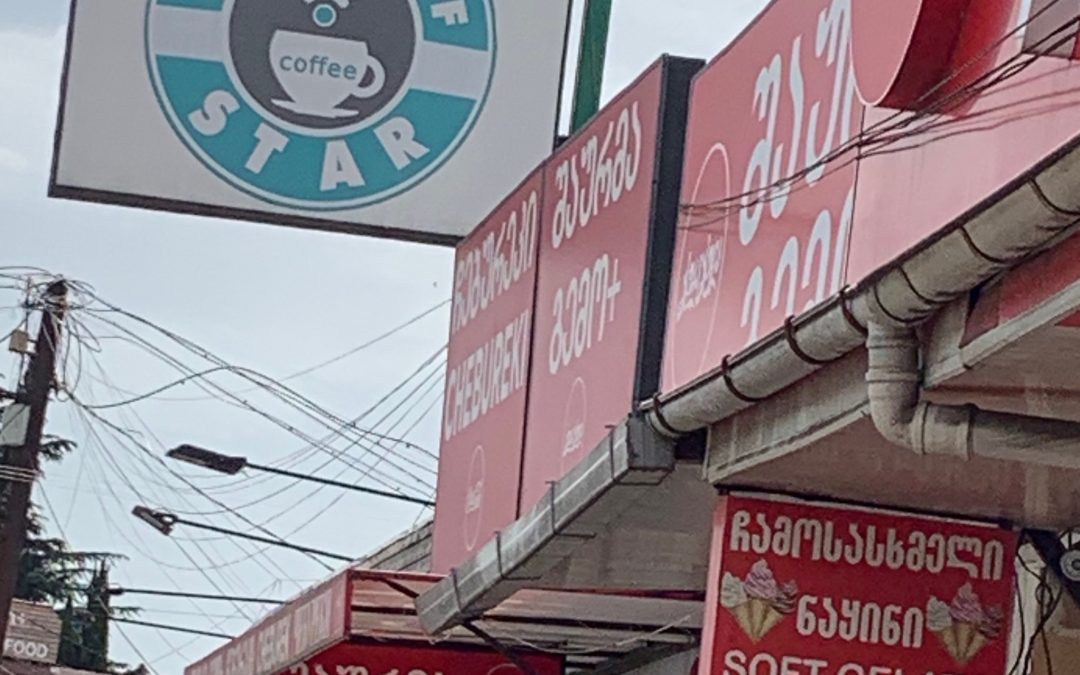
A “Me-Too” Coffee Shop in the Republic of Georgia
I face stiff competition. And I’m very competitive. It’s taken me to where I am today, and I want to keep getting the most from my competitors.
I think you do, too.
Does paying attention to our competition motivate us to do our best? Clearly, doing so sometimes can be distracting, lead to muddled “me-too” thinking, and cause us to give up before we even get started.
But it has worked for me. In my prior academic career, I published (versus perished) in the cut-throat competitive world of strategic management. My books and articles have received over 20,000 citations by other scholars. And while doing that, my speaking and consulting business earned me the lifestyle I desired.
Recently, I’ve thrown myself into a new and different competitive arena: narrative fiction and nonfiction. With the explosion of content generated by streaming video, on demand services, podcasts, blogs and audiobooks, in addition to traditional print books, my competition is everywhere I look. Did you know that more than 80 percent of Americans would like to be a published author? In 2018, there were over 45.2 thousand writers and authors in the United States.
What’s more, Nielson Bookscan reported in 2004 that of the 1.2 million books they tracked, only 25,000 — barely more than 2 percent — sold more than 5,000 copies.
Talk about stiff competition! Will it again motivate me to excel in this arena? The answer to this question, based on my experience:
It depends.
Paying close attention to my competition will serve me well only if it elicits focus and excitement, rather than scattered thinking and anxiety.
Focus versus Scattered Thinking
We all have experienced the challenges of staying focused and on task, especially those of us working in a competitive freelance environment. We can easily get distracted by what’s happening around us. Focus entails maintaining a singular point of attention, while ignoring extraneous information.
If I allow myself to get distracted by and attempt to emulate the multitude of writers around me, some of whom have been in this competitive arena much longer that I, my odds of success will plummet. Why? Because by trying to do what they do, my own offering becomes a mishmash of ideas. And that mishmash will inevitably lose its edge and become mediocre.
In short, scattered thinking about my many and varied competitors encourages imitation, and if I’m not careful, will cause me to lose sight of who I am and what I uniquely have to offer.
Excitement versus Anxiety
As a strategy consultant, before going out on the platform to give a speech to a large audience, if my hands were sweating a little and my heart was pounding a bit, I knew it was show time, and I was ready. It felt just like anxiety, but it was excitement.
Anxiety and excitement are arousal emotions that may feel remarkably similar, but their effects couldn’t be more dissimilar. How we interpret the sensations we experience when we see the competitive landscape we’re up against makes all the difference.
As another example, my husband Ed and I were at the Heathrow airport in London last summer with our twelve-year-old grandson Louis, waiting for him to board a flight back to the U.S. — by himself.
I turned to Louis and asked, “Are you anxious?”
“No,” he said. “Just excited.”
“How are those different for you?”
Without giving it much thought, Louis explained that anxiety meant he was afraid of the flight ahead, while excitement filled him with anticipation. He concluded with, “I can’t wait to board this flight.”
Ah, the wisdom of our youth! It’s interesting that Louis’ answer was not far off from how experts distinguish these two emotional states. And unfortunately paying attention to our competitors often elicits a fearful, anxious state. For example, a recent study in the U.K. found that a focus on our competition frequently promotes a hierarchical view of ourselves and others, quickly leading to anxiety, stress and a fear of rejection if we feel there’s a danger we may become inferior.
Though physiologically similar, excitement is associated with positive feelings of anticipation, while anxiety is an overwhelmingly negative emotion that’s often debilitating.
How can we use our competition to promote focus and excitement, rather than scattered thinking and anxiety?
Paying attention to our competition will motivate us to become the very best we can be if we use competitors as a point of reference, not to emulate, but rather to enable us to understand what we have to offer that is different and unique. And of course, knowing that our competitors exist then pushes us to continue to get better at what we distinctly have to offer.
Michael Phelps, our most decorated Olympian, said, “Winners focus on winning, losers focus on winners.” What he said is true, but it’s not the whole story.
In my years as a strategy consultant and professor, I counseled my clients to deeply understand the winners in their industry, but not in order to copy what they were doing. Rather, understanding their most successful competitors allowed them to identify their own distinctive competencies, giving them a valuable and sustainable advantage.
Bottom line: It’s not whether, but rather how and why, we pay attention to our competitors that matters.
Once I understand what my distinctive strengths are relative to my stiff competition, I can become laser focused on what makes me unique and allows me to flourish, and like my grandson Louis, feel that I’m excited and ready to go for it.

Grandson Louis, at 5, Ready to Go for It


Focused attention is a well-researched, powerful tool, and some of us find it a fun way to live.